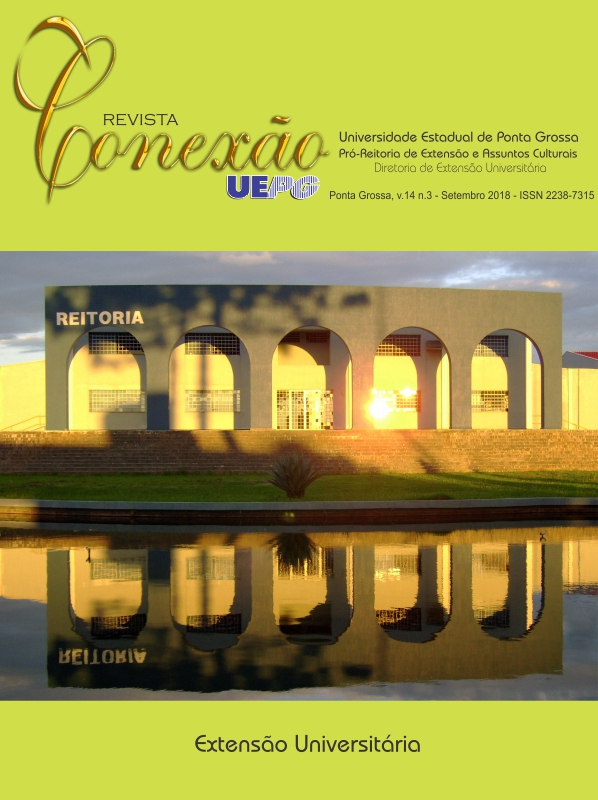CURRICULARIZAÇÃO OF EXTENTION IN FAVOR OF A UNIVERSITY SOCIALLY REFERENCED
DOI:
https://doi.org/10.5212/Rev.Conexao.v.14.i3.0004Keywords:
Extension, Curricularização, Epistemology, National Plan of Education.Abstract
This study presents an analyses of the current discussion and the implementation of extention activities in the curriculum of Brazilian public universities according to the National Plan of Education (PNE 2014-2024) which entails that at least 10% of the required academic credits in undergraduate degree must be achieved through extension activities. They are inspiring questions, such as: How include the extension activity in the undergraduate curriculum? What is the professor profile to propose/to engage in extension? How do not consider extension as just one more subject? Thus, it analyzed the process of inclusion of extension in the curriculum of Rio Grande do Norte State University (UERN). It considered the discussions carried out during the Extension Pro-Rectors Forums at regional and national level. It was possible to conclude that the insertion of extension activities in university curriculum involves epistemological perspectives that deviates the professor from academicist model exclusively based on bookish education. Extension is not an issue that many professors are used to appreciate, to be involved, to be willing, to allow oneself since it is a changing perspective.
Downloads
References
ALMEIDA, Maria da Conceição. Polifônicas Ideias: por uma ciência aberta. Porto Alegre: Sulina, 2003.
ARDOINO, Jacques. Abordagem multirreferencia (plural) das situações educativas e formativas. In: BARBOSA, J. (Org.). Multirreferencialidade nas ciências e na educação. São Carlos: EDUFScar, 1998.
BARBOSA, Joaquim Gonçalves. Uma escola multirrefrencial: a difícil arte de se autorizar, o pensamento plural de Jacques Ardoino e a educação. In: MACEDO, Roberto Sidnei; BARBOSA, Joaquim Gonçalves; BORBA, Sérgio (Orgs.). Jacques Ardoino e a Educação. Belo Horizonte: Autêntica, 2012.
BRASIL. Constituição (1988). Constituição da República Federativa do Brasil. Brasília, DF: Senado Federal: Centro Gráfico, 1988.
BRASIL. Plano Nacional de Educação - PNE/Ministério da Educação. Brasília, DF: INEP, 2014. Disponível em: http://www.planalto.gov.br/ccivil_03/_Ato2011-2014/2014/Lei/L13005.htm. Acesso em: 12 ago. 2017.
CONAES. Resolução nº 01, de 17 de junho de 2010. Normatiza o Núcleo Docente Estruturante e dá outras providências, 2010. Disponível em: http://www.ceuma.br/cpa/downloads/Resolucao_1_2010.pdf. Acesso em: 12 ago. 2017.
DE CERTEAU, Michel. A Escrita da História. 2. ed. Trad.: Maria de Lourdes Menezes. Rio de Janeiro: Forense Universitária, 2002.
FREIRE, Paulo. Pedagogia do Oprimido. 42.ed. Rio de Janeiro: Paz e Terra, 2005.
LARROSA, Jorge Bondía. Notas sobre experiência e o saber da experiência. Trad.: João Wanderley Geraldi. Revista Brasileira de Educação, Rio de Janeiro, v. 11, n.19, p. 20-28, jan.-abr. 2002. Disponível em: http://www.scielo.br/pdf/rbedu/n19/n19a02.pdf. Acesso em: 05 mai. 2015.
MACEDO, Roberto Sidnei. Compreender/mediar: o fundante da educação. Brasília: Liber Livro, 2010.
MORAES, Candida Maria. Transdisciplinaridade, criatividade e educação: fundamentos ontológicos e epistemológicos. Campinas/SP: Papirus, 2015.
MORIN, Edgar. A cabeça bem feita: repensar a reforma, reformar o pensamento. 18. ed. Rio de Janeiro: Bertrand Brasil, 2010.
OLIVEIRA, Dennis. Extensão como Dimensão Singular da Construção do Conhecimento. Revista Cultura e Extensão USP, São Paulo, n.16, p. 39-51, nov. 2016. Disponível em: www.revistas.usp.br/rce/issue/viewIssue/9657/909
PAULA, João Antonio de Paula. A extensão universitária: história, conceito e propostas. Interfaces: Revista de extensão da UFMG, Belo Horizonte, v. 1, n.1, p. 05-23, jul./nov. 2013. Disponível em: https://www.ufmg.br/proex/revistainterfaces/index.php/IREXT/article/view/5/pdf
POLÍTICA NACIONAL DE EXTENSÃO UNIVERSITÁRIA. Fórum de Pró-Reitores de Extensão das Instituições Públicas de Educação Superior Brasileiras. FORPROEX, Porto Alegre. ago. 2013.
Downloads
Additional Files
Published
Issue
Section
License
a) Authors retain copyright and grant the journal right of first publication with the work simultaneously licensed under a Creative Commons Attribution License that allows others to share the work with an acknowledgement of the work's authorship and initial publication in this journal.
b) By submitting an article to the Revista Conexão UEPG and having it approved, the authors agree to assign, without compensation, the following rights to the Journal: the rights of first publication and the rights to redistribute the article and its metadata to the indexing and reference services that the editors deem appropriate.
c) Readers are free to transfer, print out and use the articles published in the Journal, as long as there is always explicit mention to the author(s) and to the Revista Conexão UEPG and as long as there is no alteration of the original work. Any other use of the texts needs to be approved by the author(s) and by the Journal.






